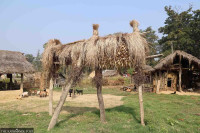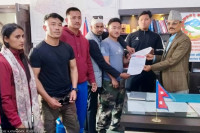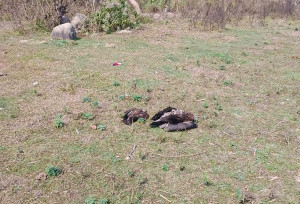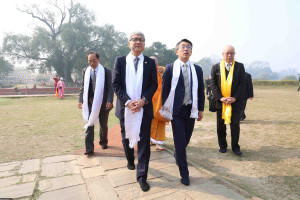Lumbini Province
Religious leaders are key to immunisation success in Kapilvastu’s Muslim settlements
Kapilvastu is lagging behind other districts in meeting the government’s immunisation targets..jpg&w=900&height=601)
Arjun Poudel
Radheshyam Kalwar, the in-charge of Maharajgung Primary Health Care Center of Maharajgunj Municipality in Kapilvastu, has held four meetings with local maulanas (Muslim religious leaders) in the past one year. During this period, he also attended several Friday congregations at local mosques requesting the maulanas to direct the devotees to immunise their children regularly.
"Some change can be seen in behavioural patterns of people since we started taking the help of religious scholars and maulanas," Kalwar told the Post over the phone from Kapilvastu. "Without their help and active participation, it is challenging to convince people of our area to avail the health services offered by the government."
Kapilvastu is the only district in the country where the Ministry of Health and Population conducted a mass drug administration programme against filariasis for 11 consecutive years but failed to achieve its target.
The coverage of the government’s various health schemes in the district, including adherence of people to immunisation and family planning programmes, is very low compared to other districts. This is particularly more glaring in municipalities like Krishnanagar and Maharajgung, where a vast section of the Muslim population resides.
Last year, there was a measles outbreak in several wards of Krishnanagar. Similarly, during the preceding year, there was an outbreak of the highly contagious virus in Maharajgunj.
Kalwar said that it is very difficult to convince people to seek healthcare services. Despite having a birthing centre within 500 metres, there are women giving birth at home, risking their lives. They skip immunisation programmes even when health workers reach their village in the outreach camp. Similarly, the trend of going to their maternal homes in India during the time of delivery and returning to their in-laws home after several months has deprived several newly-born children of the immunisation programme.
After exhausting their efforts in what seemed like a failing cause, the primary health care centre has adopted a new policy: Take the Maulana into confidence and get access with their help.
"We have also been inviting males in the meetings of the mothers’ group," said Kalwar. "Men generally do not attend mothers’ group meetings, so we have been holding separate men's meetings."
Dr Jhalak Sharma, chief of immunisation section at the Family Welfare Division, says social as well as health indicators of Dalit Muslim and backward communities have been found to be very low.
“People in the Muslim community where the literacy rate is too low, follow the instructions of the Maulana more than that of health workers,” says Sharma.
He added: "After the outbreak, we reached the affected villages and held meetings with the Maulanas. The meetings have been yielding positive results, but it will take time. We have been encouraging health workers to take the help of religious scholars in the health programmes, including our nation-wide campaigns."




 9.7°C Kathmandu
9.7°C Kathmandu















